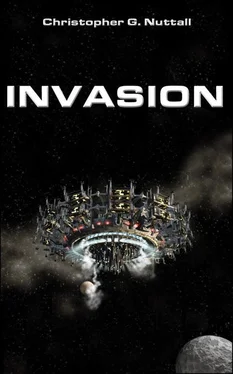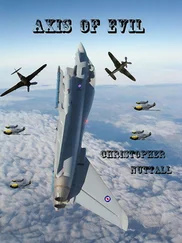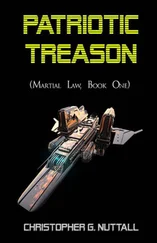His eyes lit up with the glow of enthusiasm. “Now, take the AK-47, preferred weapon of rag-headed punks from one end of the world to the other,” he continued. “It’s simple, easy to learn and can take one hell of a lot of mistreatment by illiterate ditch-diggers before it craps out. This technology, Colonel, is an alien version of the AK-47; they could build handheld lasers and other really nifty shit, but would it be usable on the battlefield? This stuff may be crude, but it works .”
“But it can be countered, right?” Paul asked. “We can get around their tech.”
“Oh, of course,” Gary said. “Some of their weapons are actually inferior to ours; the handful of their sniper rifles are far inferior to ours, but don’t let that fool you. In the hands of someone who knows what they’re doing, a blunderbuss is a lethal weapon. Their night-vision gear is also inferior, but we’ve actually had reports that they’ve been improving theirs or deploying newer stuff… and they have the distant advantages of not needing to worry about how much damage they do to their surroundings. Who cares? It’s all going to be knocked down, right?”
“So it seems,” Paul said, tightly. The images from Texas were far from reassuring. “If they keep expanding at their current rate, they’ll be knocking down Austin before too long.”
“I bet that will make the people unhappy,” Gary said, lightly. He grinned as he paced over to the other table. “Now this” — he lifted up one of the alien suits — “is sheer genius. There just isn’t any other word.”
Paul studied the garment thoughtfully. He’d seen images, pictures and videos, of the alien stormtroopers, but it was the first time he’d actually seen one of their outfits. It seemed to be composed of slinky silk, something that just shimmied over his hands, like liquid oil. It felt weird to the touch, as if he wasn’t touching anything at all, almost as if it wasn’t really there.
“I give up,” he said, finally. “What the hell is it?”
“Buggered if I know,” Gary said. “We had a few dozen materials experts, scientists, even a pair of fashion designers in here and they took two of them to pieces, only to discover that it’s something well beyond our current capabilities. You want to know what this baby can do?”
Paul lifted an eyebrow. “Show me.”
“Watch,” Gary said. He made a fist and waved it in front of the alien garment in a threatening style. “Take that, you… illegal alien.”
He thumped the garment, which made a metallic sound. Paul stared as Gary rubbed his hand. “That always hurts,” he said. “Somehow, you hit this thing with enough force, it hardens instantly, hard enough to repel the attack. You can cut it with a knife, if you try, but come in too hard and it just hardens. We’re lucky they didn’t manage to get the tech even tougher; this stuff is better than our body armour already and if it had been better… well, invincible alien warriors would have kicked our butts all over the world.”
“But they can be killed,” Paul protested. “I mean… the wearer of this one doesn’t need it anymore, does he?”
“No,” Gary said. “Bullets do get through, mainly headshots, although the armour is far from perfect. The interesting thing is what else it does. It provides near-complete protection from chemical weapons, for one thing, somehow filtering them all out before they can reach the alien inside. There is a breather here” — he pointed to a spot under the mask — “that filters out anything dangerous, or merely irritating. I imagine that some chemical weapons, the basic ones if nothing else, will work on unprotected aliens, but so far no one has let us test them on the alien captives.”
“I don’t think that that would be a good idea,” Paul said, dryly. “If we take one of their Inquisitors alive, feel free to do whatever you like to him, but we need the others.”
“Sooner or later, someone is going to pull off a chemical strike on one of their settlements,” Gary said. “They don’t wear the armour all the time; hell, their women go around topless. Something simple is going to have an effect, but what?”
“Knowing our luck, it will probably give them superpowers,” Paul joked. “Anything else that’s come out of R &D?”
“Microwaves,” Gary said. He smiled thinly. “There is a school of thought that believes that we can use microwaves to really mess up their day. The designers are currently working on something we can test in the field, as the President has banned testing them on any of our prisoners, and when we have a working model, it’ll be tested. Just imagine a group of alien infantry, running along, when suddenly the liquid in their legs starts to boil. It’s based around a crowd-control weapon, one that can drive entire crowds away, so it’s workable… but we don’t know how much protection their suits will provide. We’ll just have to test it and see.”
He put down the suit and scowled. “That’s something that we won’t have for the offensive, I’m afraid,” he said. “It’s going to be at least two weeks before we have it ready to go…”
“Never mind,” Paul said. It wasn’t a weapon that could be used on all of the aliens at once. The real priority, now, was weapons that could be used against the spacecraft in orbit. If they could be destroyed, despite the vast damage inflicted on America, they could liberate Texas in fairly short order. “Have you prepared the special suits?”
Gary nodded. “There’s one rather small problem with them,” he admitted, as he led the way into yet another way. “We don’t move like the aliens. The first three will be alright, as they will be worn by aliens, but the minute they see the others moving, they will smell a rather large rat. How do you intend to solve that?”
“Leave that to us,” Paul assured him. The fewer people who knew that, the better; no one knew how far the aliens might have compromised their security. There were far too many people who had had relatives in Texas, perhaps now in alien hands. “Are you sure that you can have all the craft ready to fly on schedule?”
“Yep,” Gary said. “Hell, we could fly in twenty-four hours, if you want. It’s just a question of fitting everything together and then we can fly.”
“Good work,” Paul said. He paused. “Are you sure that you want to fly the mission in person?”
“I’m the most experienced spaceman the United States has left,” Gary said. “I did think about taking one of the aliens along with us, but that… might provide too much temptation for them.” He paused suddenly. “Do you really trust them?”
“I think so,” Paul said. “You know, in all of the skirmishes along the Red Zone’s border, not a one has ever surrendered? That fits in with what Femala told us; they kill male prisoners without mercy.”
“They took prisoners from us,” Gary said, thoughtfully. “Have you considered that?”
“They’re being worked to death,” Paul said. The images taken by the insurgents had been spread across the world, awakening a new desire to fight on, whatever the cost. The aliens had been doing the same in the Middle East and probably Australia, working the human prisoners to death. The soldiers, sailors and airmen might have been in the best of health when they’d been captured, but after nearly three months, they’d be dropping like flies. “I don’t think that that counts as the softly-softly approach.”
“No,” Gary said. “Still, they’re not human, and so… I don’t trust them, not completely.”
“Without them, we could never have gotten this far,” Paul reminded him. “We don’t have to trust them, but we need them.”
“One week,” Gary mused. “One week… to victory, or certain destruction.”
Читать дальше












